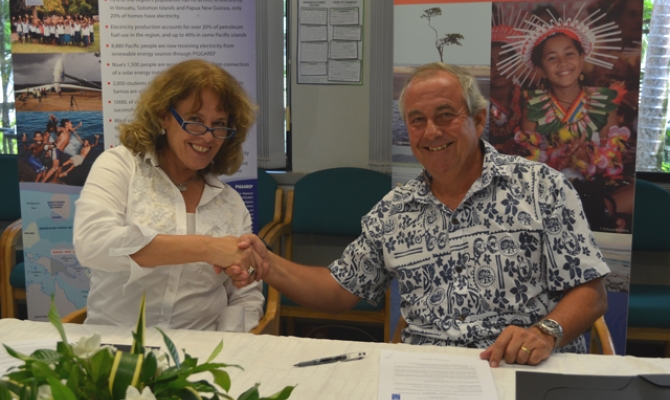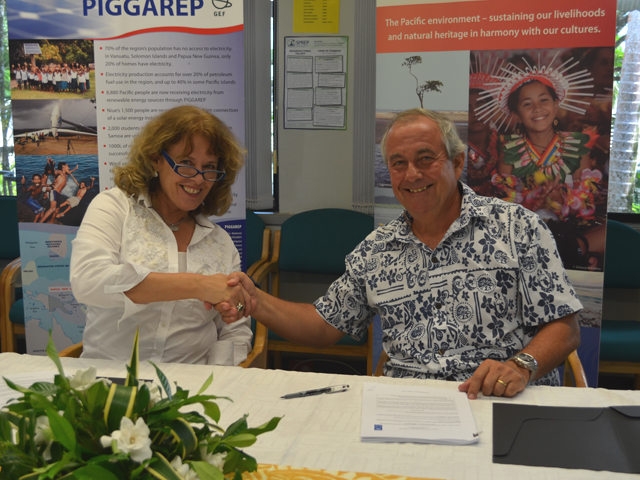
Climate Change Resilience
An additional one million dollars has been allocated for renewable energy activities in the Cook Islands, Kiribati and Samoa under PIGGAREP+, a Pacific regional project to reduce greenhouse gas emissions through renewable energy activities.
The formal agreement for this was signed at the Secretariat of the Pacific Regional Environment Programme (SPREP) in Samoa this week.

At the signing of the agreement Mr. David Sheppard, Director-General of SPREP, spoke of the successes of the PIGGAREP project to date."This very important project has provided practical and focused assistance to Pacific island countries to help them achieve their ambitious renewable energy targets."
"It's great to be building on these successes through PIGGAREP+ which will deliver practical projects in solar power, bioenergy and biofuel. It is a pleasure to partner and work with UNDP and we look forward to achieving great outcomes in renewable energy activities."
Ms. Lizbeth Cullity, Resident Representative of the United Nations Development Programme (UNDP), Samoa Multi Country Office, added that the UNDP is enthusiastic about achieving further results with the additional funding. "We look forward to the impact PIGGAREP and PIGGAREP+ will bring to communities across the Pacific in terms of clean, modern and sustainable energy solutions, thanks to funding from the Global Environment Facility, Denmark and SIDS DOCK."
Of the one million dollars, USD450,000 will go towards the installation and operation of a solar power generation system on the island of Palmerston in the Cook Islands to help meet their electricity target of 50% renewable energy by 2015 and 100% by 2020.
USD250,000 will be used to assist with the installation and operation of a biofuel mill to generate power on Abemama Island in Kiribati. Under the 2013 Majuro Declaration, Kiribati committed to reducing their fuel needed for electricity generation by 45% on South Tarawa, 60% on Kiritimati Island, 60% of rural public infrastructure and 100% for rural public and private institutions by the year 2025.
Samoa has a target of reducing their growth rate in the volume of imported fossil fuels by 10% by 2016. One step towards this is a biogas generation system which will provide power in the rural agricultural areas with the support of USD300,000 under this agreement.
The funds to help support these activities through PIGGAREP+ have been made possible through the SIDS DOCK Support Program, a joint initiative of the UNDP and the World Bank, developed in close consultation with the Alliance of Small Island States and funded by the Government of Denmark.
This initiative aims to support Small Island Developing States in their transition to low carbon economies through development and deployment of renewable energy resources and promotion of greater energy efficiency.
For more information please email PIGGAREP Project Manager, Sili'a Kilepoa Ualesi on [email protected]
The formal agreement for this was signed at the Secretariat of the Pacific Regional Environment Programme (SPREP) in Samoa this week.

At the signing of the agreement Mr. David Sheppard, Director-General of SPREP, spoke of the successes of the PIGGAREP project to date."This very important project has provided practical and focused assistance to Pacific island countries to help them achieve their ambitious renewable energy targets."
"It's great to be building on these successes through PIGGAREP+ which will deliver practical projects in solar power, bioenergy and biofuel. It is a pleasure to partner and work with UNDP and we look forward to achieving great outcomes in renewable energy activities."
Ms. Lizbeth Cullity, Resident Representative of the United Nations Development Programme (UNDP), Samoa Multi Country Office, added that the UNDP is enthusiastic about achieving further results with the additional funding. "We look forward to the impact PIGGAREP and PIGGAREP+ will bring to communities across the Pacific in terms of clean, modern and sustainable energy solutions, thanks to funding from the Global Environment Facility, Denmark and SIDS DOCK."
Of the one million dollars, USD450,000 will go towards the installation and operation of a solar power generation system on the island of Palmerston in the Cook Islands to help meet their electricity target of 50% renewable energy by 2015 and 100% by 2020.
USD250,000 will be used to assist with the installation and operation of a biofuel mill to generate power on Abemama Island in Kiribati. Under the 2013 Majuro Declaration, Kiribati committed to reducing their fuel needed for electricity generation by 45% on South Tarawa, 60% on Kiritimati Island, 60% of rural public infrastructure and 100% for rural public and private institutions by the year 2025.
Samoa has a target of reducing their growth rate in the volume of imported fossil fuels by 10% by 2016. One step towards this is a biogas generation system which will provide power in the rural agricultural areas with the support of USD300,000 under this agreement.
The funds to help support these activities through PIGGAREP+ have been made possible through the SIDS DOCK Support Program, a joint initiative of the UNDP and the World Bank, developed in close consultation with the Alliance of Small Island States and funded by the Government of Denmark.
This initiative aims to support Small Island Developing States in their transition to low carbon economies through development and deployment of renewable energy resources and promotion of greater energy efficiency.
For more information please email PIGGAREP Project Manager, Sili'a Kilepoa Ualesi on [email protected]